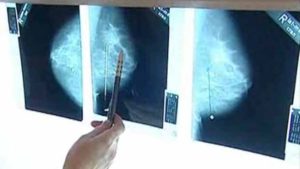 A report by 3 prominent specialists (including Gilbert Welch - who has been discussed in earlier posts) about trends in metastatic breast and prostate cancer came out today in the New England Journal of Medicine. The biggest finding was that mammograms have not cut the rate of metastatic breast cancer. Mammography screening is based on the hope that cancer that is detected in an early, localized phase can then be treated more easily and that it would reduce the numbers of metastastic cancers (that spread to lymph nodes and to more distant organs) that eventually kill. However, this has not happened.The incidence of metastatic breast cancer has been stable since 1975, and the average age of diagnosis among women older than 40 is still 63.7 years . The authors theorize that "breast cancer is a systemic disease by the time it's detectable". From Medical Xpress:
A report by 3 prominent specialists (including Gilbert Welch - who has been discussed in earlier posts) about trends in metastatic breast and prostate cancer came out today in the New England Journal of Medicine. The biggest finding was that mammograms have not cut the rate of metastatic breast cancer. Mammography screening is based on the hope that cancer that is detected in an early, localized phase can then be treated more easily and that it would reduce the numbers of metastastic cancers (that spread to lymph nodes and to more distant organs) that eventually kill. However, this has not happened.The incidence of metastatic breast cancer has been stable since 1975, and the average age of diagnosis among women older than 40 is still 63.7 years . The authors theorize that "breast cancer is a systemic disease by the time it's detectable". From Medical Xpress:
Study: Mammograms haven't cut rate of advanced breast cancer
A new report raises fresh questions about the value of mammograms. The rate of cancers that have already spread far beyond the breast when they are discovered has stayed stable for decades, suggesting that screening and early detection are not preventing the most dangerous forms of the disease. The report, in Thursday's New England Journal of Medicine, is by three prominent cancer specialists and is based on federal statistics going back to the 1970s.
"We're undergoing what I think for the public is a very confusing debate" about screening, but it's really "a course correction" prompted by more awareness of its risks and benefits to various groups of women, said Dr. H. Gilbert Welch, a health policy expert at Dartmouth Medical School. "All they heard for years was, 'there are only benefits.'" He is the lead author of the report, co-written with Dr. David Gorski of Wayne State University School of Medicine in Detroit and Dr. Peter Albertsen of the University of Connecticut Health Center in Farmington.
"Screening offers hope that cancer can be detected in an early, localized phase when it's more amenable to treatment," they write, but that assumes that cancer starts in one place, grows and then spreads. If that was always true, screening would reduce the rate of advanced cancers. And that has not happened. The rate of breast cancers detected at an advanced stage has been stable since 1975, despite wide use of mammography since the 1980s. The average age of women diagnosed with cancer also has remained around 63, another sign cancers are not being found sooner.
The trends suggest that some breast cancers are already "systemic" or widely spread from the start, and that finding them sooner has limited impact. "Screening mammography has been unable to identify those bad cancers, destined to become metastatic, at an earlier stage. That doesn't say mammography doesn't help less aggressive cancers," but those are less likely to prove deadly, Welch said.
Dr. Barnett Kramer, a screening expert at the National Cancer Institute, said the report shows the limitations of mammography. "I wouldn't want to say it has had no effect but it certainly has not lived up to the anticipated effect," he said. For every tumor detected early because of mammography, "you would hope to see ... an equal reduction in metastatic disease, and that has not occurred."
The situation is very different with prostate cancer. The rate of advanced cases of that disease has been cut in half since screening with PSA blood tests came into wide use around 1988, and the average age at which men are diagnosed has fallen—from 72 to 70, the authors write. However, this does not prove PSA testing is good. Shifting the stage at which a disease is diagnosed is "only the first step for successful screening," which also has to save lives to be worthwhile, Welch said. "Just because you find something earlier doesn't mean you can change its course."
Again, Kramer agreed. Prostate screening, "when put to a definitive test, did not show a clear reduction in prostate cancer mortality" in large, rigorously done trials, he said. The government task force recommends against PSA testing, and says its risks outweigh its benefits for most men.
"Screening is a close call," Welch said. "My guess is few people are helped" by prostate or breast cancer screening while many are harmed by false alarms that trigger unnecessary tests and treatments, he said.
The original report, which also includes a discussion on prostate cancer and the PSA test, in the New England Journal of Medicine: Trends in Metastatic Breast and Prostate Cancer — Lessons in Cancer Dynamics
